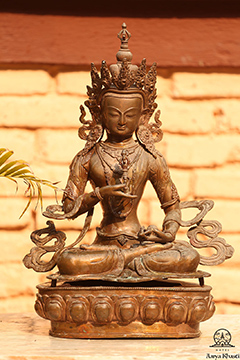
Aarya in Buddhism means something which is noble, valuable or out of the ordinary. The word “Khasti”, in Nepal Bhasa, is the name given to the Boudhanath Stupa. Khasti or the dew drop stupa comes from merging of yet another two Nepal Bhasa words “khasu” meaning fog and “ti” meaning liquid. According to a legend, the Boudhanath Stupa was constructed by the liquid gathered from the morning fogs(dew drops). Hence the word khasti came into being and the stupa was named after it. During the reign of then King Dharmadeva, the kingdom used to face serious drought calamities which would last upto 12 years. The king built a pond with stone water spouts near the present Royal Palace.But the water did not come out of the water spouts. It worried the King. He consulted his astrologers for the solution, they told him that a sacrifice to the gods would be needed to make it end. Not just sacrifice of any man, but the most virtuous man in the entire kingdom who is gifted with all the 32 qualities. After giving it a careful thought, the King came to a conclusion that it was only himself and his son, Mandeva, who were qualified to be the most virtuous men in the Kingdom. The King decided that he had to sacrifice himself. He then ordered his son to decapitate the head of anyone found lying near the palace at night. Wrapping himself up in a blanket, the King went and laid down near the palace later that night. Following his father’s orders, the son Mandeva saw someone lying down near the palace and decapitated him with a stroke of his sword. Little did the Prince know that it was his own father inside the blanket. He was horrified to see his father’s head flying after being detached from the body. The head landed in the temple of Vajra Yogini in Sankhu.